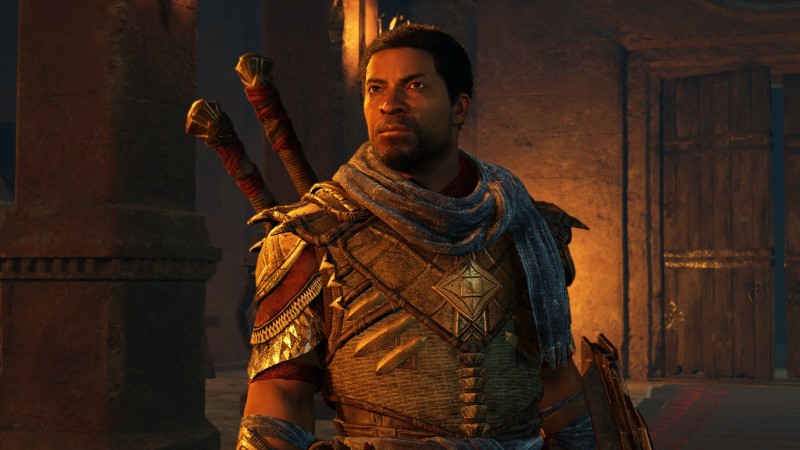Our extra-large special edition is here. Subscribe today and receive the 25% longer issue at no extra cost!
Should You Play Middle-earth: Shadow Of War’s Desolation Of Mordor DLC?

After launching in September, Middle-earth: Shadow of War has continually tweaked the experience through small patches and large overhauls such as the complete removal of the unpopular market feature. In February, Monolith released Blade of Galadriel, the first story expansion, starring Eltariel. With its second expansion, Monolith is taking players to a completely new region as Baranor, the Gondorian commander you meet in the early stages of the main game.
Both Talion and Eltariel possess a Ring of Power, meaning they have supernatural abilities at their disposal. Baranor has no such luck. As such, he is not only limited in terms of ability, but also his mortality.
This fundamentally changes the flow of exploration, as Baranor cannot leap tall buildings in a single bound or run inhumanly fast (he gets a parachute and a grapple hook instead), but it shuffles the core of the beloved Nemesis system to even greater extents. Rather than finding orcs to brand to join you in battle, you hire human mercenaries using currency you find on the battlefield.
I enjoyed the process of saving up for a legendary mercenary and then leveling them up by completing side missions with them, but much of the magic of Shadow of War is lost when you strip most of the Nemesis system away. I missed hunting down the most powerful orcs on the battlefield to infiltrate their leader's base and turn on them in a crucial moment. Without the ability to resurrect Baranor after he falls in battle, you also miss out on those amazing relationships you form with the orcs who kill you.
Since Baranor is mortal, the Desolation of Mordor uses permadeath mechanics; if you die, you lose everything but story mission progress and skills obtained from finding artifacts in the world. This means all outposts you secure and mercenaries you hire are gone. Anyone who played Shadow of War's base game knows how quick situations can escalate out of control. Death is always within arm's reach, but between health elixirs, the last chance quick-time event, and a special rally ability that can be upgraded to restore your health, Baranor has myriad ways to stay alive. While he doesn't have the elven agility of Talion or Eltarial, zipping away using his Batman-like grapple hook, or jumping off a tower and parachuting into the distance is fun and satisfying.

Despite Baranor's humanity, he's far from helpless. A sergeant of Gondor, Baranor is skilled in close-range combat; many of the basic moves you pulled off as Talion, you can do with Baranor. In addition, he doesn't lose the time-slowing focus ability of Talion, allowing for deadly accuracy with his crossbow.
The story centers around Baranor finding a new home after Sauron's successful siege of Minas Ithil in the main Shadow of War story. After a close call in the opening stage, he partners with Torvin, the dwarf hunter from Shadow of Mordor, and Serka, a mercenary king and Baranor's brother, to take back the region. I enjoyed a few of the bigger moments in the story, such as attracting a massive worm to destroy a passageway, but much of the expansion is similar to what you've likely already done in Shadow of War.
Most of your time in the expansion is spent securing outposts and building toward your ultimate goal of conquering the region's fortress. While I love the fortress assaults of Shadow of War, without the sneakiness and betrayal of the Nemesis system, the moment felt less epic and more like just another large-scale battle. While that's fine, since I adore the rhythmic combat of the series, I couldn't help but feel a bit underwhelmed by the story's grand climax.
Once you wrap up the story, you receive a score based on how you performed and the difficulty you played on. This encourages replayability for the standalone mode, but I was more inclined to jump into Lithlad as Talion in the main game, which feels like the most substantial part of this expansion as it adds another region to conquer.
Though short and ultimately uneventful, Desolation of Mordor is a fun excuse to jump back into Middle-earth: Shadow of War. Baranor's skillset and mortality present just enough of a different experience to warrant a playthrough of Desolation of Mordor, but fans of the Nemesis system and the power fantasy of the main game will likely most benefit from the addition of Lithlad to Talion's story.

Get the Game Informer Print Edition!
Explore your favorite games in premium print format, delivered to your door.
- 10 issues per year
- Only $4.80 per issue
- Full digital magazine archive access
- Since 1991








